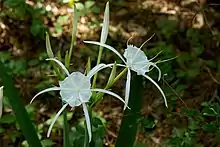Hymenocallis occidentalis
Hymenocallis occidentalis is a plant species native to the southern United States. It is known along the Gulf Coast from South Carolina to Texas, and in the Mississippi Valley as far north as southern Illinois and Indiana.[3] It is also cultivated as an ornamental elsewhere because of its showy, sweet-smelling flowers.[1] Common names include woodland spider-lily, hammock spider-lily or northern spider-lily.[4]
| Woodland spider-lily | |
|---|---|
 | |
| Scientific classification | |
| Kingdom: | Plantae |
| Clade: | Tracheophytes |
| Clade: | Angiosperms |
| Clade: | Monocots |
| Order: | Asparagales |
| Family: | Amaryllidaceae |
| Subfamily: | Amaryllidoideae |
| Genus: | Hymenocallis |
| Species: | H. occidentalis |
| Binomial name | |
| Hymenocallis occidentalis | |
| Synonyms[1][2] | |
| |
_(38560842461).jpg.webp)
Many of the other U.S. species of the genus grow in wetlands and along streambanks, but H. occidentalis can often be found in mesic forests.[1] Some of the Mexican species (e. g. H. clivorum and H. pimana) can similarly be found some distance from waterways.[5][6][7]
Hymenocallis occidentalis is a bulb-forming perennial herb bearing an umbel of 3-9 showy flowers, each white with a green center, opening one at a time. Leaves are lanceolate, up to 60 cm long and 6 cm wide at their widest points.[1][7][8][9][10]
The name Hymenocallis caroliniana has been frequently misapplied to this species but is properly a synonym of Pancratium maritimum.
Varieties
As of May 2021, Plants of the World Online accepted two varieties:[11]
- Hymenocallis occidentalis var. eulae (Shinners) Ger.L.Sm. & Flory – native to Oklahoma and Texas
- Hymenocallis occidentalis var. occidentalis – native to Alabama, Arkansas, Florida, Georgia, Illinois, Indiana, Kentucky, Louisiana, Mississippi, Missouri, North Carolina, South Carolina and Tennessee
References
- Flora of North America vol 26, p 285.
- The Plant List
- Biota of North America Program 2013 county distribution map
- USDA, NRCS (n.d.). "Hymenocallis occidentalis". The PLANTS Database (plants.usda.gov). Greensboro, North Carolina: National Plant Data Team. Retrieved 30 May 2021.
- Laferrière, Joseph E. 1998. A new Hymenocallis (Amaryllidaceae) from Sonora, Mexico. Novon 8:242-243.
- Laferrière, Joseph E. 1990. Hymenocallis pimana (Amaryllidaceae): a new species from northwestern Mexico. Phytologia 68(4):255-259.
- Wunderlin, R. P. 1998. Guide to the Vascular Plants of Florida i–x, 1–806. University Press of Florida, Gainesville.
- Traub, Hamilton Paul. 1962. Plant life. Stanford 18: 71, Hymenocallis moldenkeana
- Le Conte, John. 1836. Annals of the Lyceum of Natural History of New York 3: 146, Pancratium occidentale.
- Kunth, Karl Sigismund. 1850. Enumeratio Plantarum Omnium Hucusque Cognitarum 5: 856. Hymenocallis occidentalis'
- "Hymenocallis occidentalis (Leconte) Kunth". Plants of the World Online. Royal Botanic Gardens, Kew. Retrieved 2021-05-30.
External links